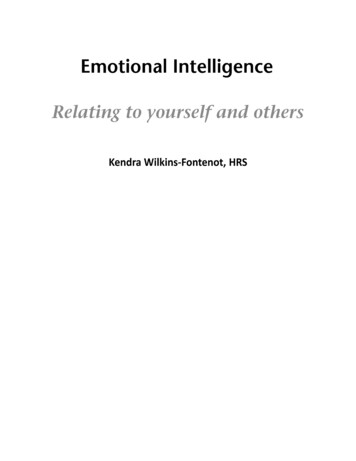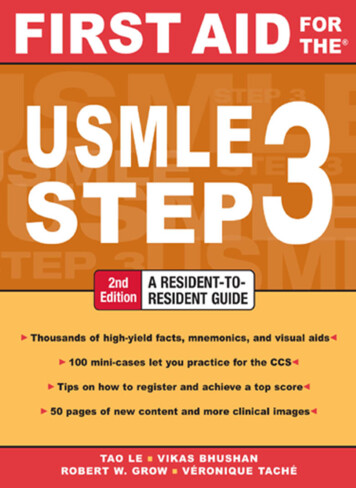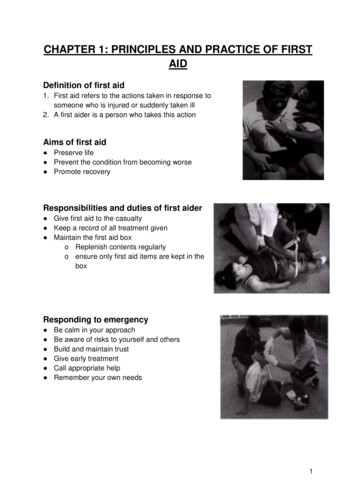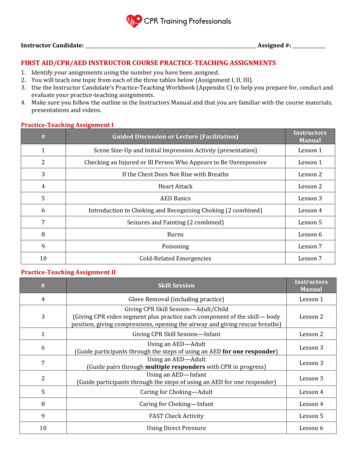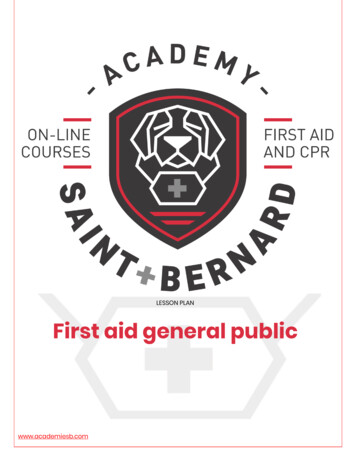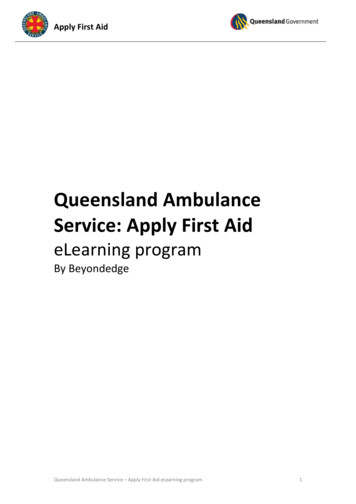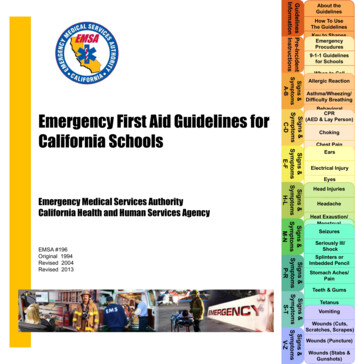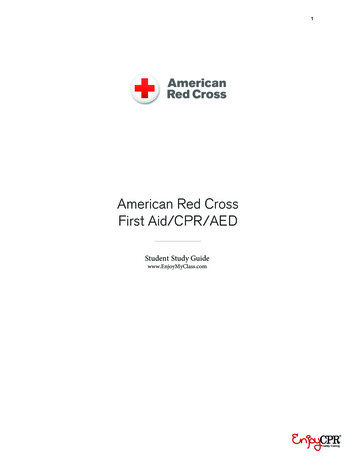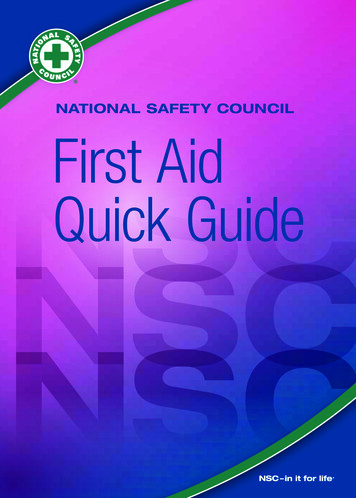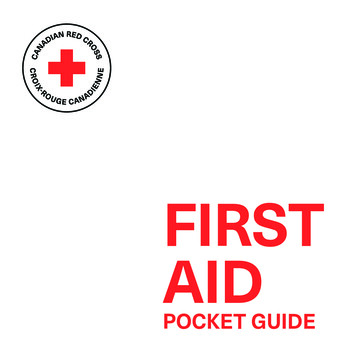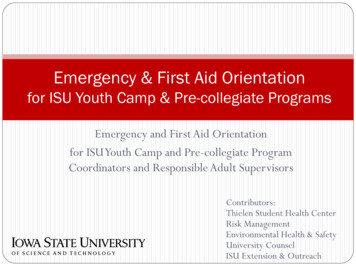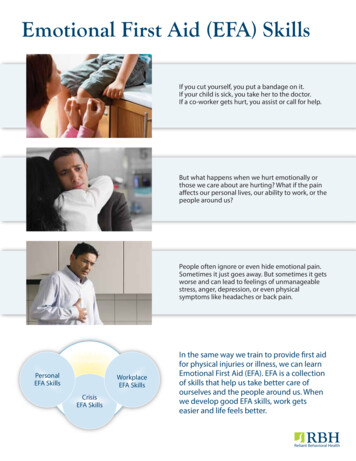
Transcription
Emotional First Aid (EFA) SkillsIf you cut yourself, you put a bandage on it.If your child is sick, you take her to the doctor.If a co-worker gets hurt, you assist or call for help.But what happens when we hurt emotionally orthose we care about are hurting? What if the painaffects our personal lives, our ability to work, or thepeople around us?People often ignore or even hide emotional pain.Sometimes it just goes away. But sometimes it getsworse and can lead to feelings of unmanageablestress, anger, depression, or even physicalsymptoms like headaches or back pain.EFAfor EmployeesPersonalEFA SkillsWorkplaceEFA SkillsCrisisEFA SkillsIn the same way we train to provide first aidfor physical injuries or illness, we can learnEmotional First Aid (EFA). EFA is a collectionof skills that help us take better care ofourselves and the people around us. Whenwe develop good EFA skills, work getseasier and life feels better.RBHReliant Behavioral Health
Personal EFA SkillsEMOTIONAL FIRST AIDLoss. Change. Loneliness. Rejection. Failure. Heartbreak.A psychological injury can hurt just as much as a physical one. Sometimes the pain lasts even longer.With Emotional First Aid (EFA) skills, you gain a better outlook on life and recover from challenges faster.5 Daily EFA Skills to PracticeDon’t wait for a crisis. Start now by practicing the following skills in your daily life.1. Notice emotional pain. If you recently experienced a personal issue or traumatic event, and youjust can’t get past it, you need to pay attention to that psychological injury. Ignoring pain won’tmake it go away. You might be feeling angry, sad, or frustrated, but a psychological injury can alsocause physical symptoms. Pay attention to your pain. How are you feeling right now?2. Be kind to yourself. Negative self-talk like, “I’m so stupid,” and “I do everything wrong,” damagesyour self-esteem and resilience. Treat yourself with the same compassion you’d offer a friend orloved one. Next time you are feeling negative, substitute a hurtful thought with a positive one.Take a few seconds to say or think something nice about yourself right now.3. Avoid rumination. Repeatedly replaying distressing events in your mind is not a helpful way toheal wounds. To disrupt rumination, distract yourself by doing positive activities that require mentalor physical attention. If you catch yourself ruminating, label it as worrying and quickly move on.4. Redefine failure. Avoid focusing on what you can’t do instead of what you can do. When youexperience a personal failure, make a list of what you’d control or change if you were to try again.Tell yourself that next time, you’ll do better, and then forgive yourself and go on.5. Find meaning in loss. Find meaning in your loss by reframing your thinking about it. Considerwhat you’ve gained from the experience and what you could change to add more purpose to yourlife. Try supporting others who have experienced a similar loss to lessen your own pain.Source: Winch, G. (2014). Emotional First Aid: Healing Rejection, Guilt, Failure and Other Everyday Hurts.New York: Plume – Penguin Group.RBHReliant Behavioral Health
Workplace EFA SkillsEMOTIONAL FIRST AIDPeople get hurt at work every day. While we spendtime training to respond to physical injuries, many ofus just don’t know how to react when someone nearus is emotionally hurting and needs help.8 Tips for Helping Others with EFA1. Be a positive listener. When someone is stuckin a rumination loop, they might just need a goodlistener to help them move on. Listen without judging,but try to pick up on cues of how they were hurt.Do they feel embarrassed? Are they insulted?2. Encourage positive self-talk. Repeat keymoments of their story, so they know you’re listening,but leave out any negative self-talk they included.3. Remind them to be kind. Ask how they’dfeel if you were in their situation. Would they thinkyou’re foolish? Would they expect you to feel ashamed?Remind them to treat themselves the waythey’d treat you or other co-workers or friends.4. Help them reframe the situation. Askwhat they would do differently next time. This canhelp them move past the incident by planningfor the future.5. Encourage resolution. If possible, suggestthey talk about it with the other people involved.Most people don’t want to hurt others, and they willlikely modify their behaviors in the future.We All React DifferentlySevere emotional events affect almosteveryone. But sometimes, less severeexperiences can also damage people.Being yelled at by a supervisor. Beingblamed for something. Fighting with aco-worker. Feeling misunderstood.Facing unexpected changes.These situations can hurt. Some of us recover onour own, but without emotional first aid (EFA),the pain can grow into lingering wounds.We all respond to personal experiences indifferent ways at different times. One personmight be feeling more sensitive than usualbecause of problems at home. Another maysimply lack personal resilience skills.What might seem like a small incidentto you, could feel like the world iscrashing down on a co-worker.6. Help them find closure. Recommend theyWithout EFA skills, people often ruminate,replaying incidents in their heads or talkingabout them with co-workers or family members.Rumination doesn’t resolve pain, so people getstuck and develop psychological wounds.7. Share mindfulness strategies you use.Rumination can lead to personal problems,including depression or substance abuse.Being around people who spend timeruminating can also damage you.8. Recommend counseling. If they just seemYou can use your EFA skills to help othersavoid psychological wounds while you helpprotect yourself from negativity at work.write about what happened and then write how itcould have gone better. Writing can help bringclosure and break the over-thinking cycle.Go for a walk with them or suggest other mindfulactivities such as breathing exercises to help themrefocus. Let them know what works for you.stuck and unopen to your feedback, recommend EAPcounseling. Counseling can help people recover frompsychological wounds fast. It’s free and confidential.RBHReliant Behavioral Health
Crisis EFA SkillsEMOTIONAL FIRST AID10 Emergency EFA Skillsto Help Yourself1. Take five slow, deep breaths.2. Remind yourself that this, too,shall pass.3. Accept all of your feelings.4. Have faith in you. You can handle morethan you might believe at this moment.Use meditation or prayer for addedsupport.5. Don’t take anything personally.6. Try to stick with your routine, even ifyou feel dazed or numb. It will helpanchor you.7. Eat, sleep, or get some fresh air.8. Picture your 6-year-old self, and lovinglyembrace that child. Gently reassure thefrightened self inside you.9. Understand you are here, in this life, foreverything, good and bad. Visualizeyourself as a river of experiences, andlet life flow without judgment.10. Connect with someone. Talk to a friend,family member, or EAP counselor.Helping a co-worker might alsohelp you feel better. Source: goodtherapy.orgTraumatic events can happen anywhere, including atwork. They might include an accident, an act ofviolence, or a natural disaster. If something like thishappens at your workplace, take care of yourself.Once you know you’re okay, try to help others whomight be suffering from emotional shock.5 Tips for Helping SomeoneWho Has Just Been Traumatized1. Help with any bodily injuries, medical issues, orphysical needs first.2. Go to a safe place if possible.3. Stay with them. Don’t get up and act like nothinghappened. Help them stay dry, warm, and still.Trembling or being emotional is part of healing,and better than ‘numbing out.’4. If the person wants to talk, listen withoutinterrupting or changing the subject.5. Encourage them to reconnect with their body andfeel the sensations in their body fully.Trauma cuts us off from our bodies. When weare in overwhelming danger, we dissociate orleave our bodies. This is helpful to us during atraumatic event, but we need to reconnect after,so we don’t get stuck in trauma.You can help someone in emotional shock byasking permission to hold their hand or squeezetheir shoulder.If they are uncomfortable being touched, askthem to describe the color of the room or theshirt you are wearing. You could also give themsomething to hold, like a coin or scarf, and talkabout how it feels.Ask them to tell you about a favorite place,where they feel safe or happy. Have themdescribe how they feel when they are in thatplace, including the smells, sounds, and colors.Source: https://www.ncmhr.org/downloads/trauma first aid fact sheet12-08.pdfRBHReliant Behavioral Health
Planning EFA KitsYou probably have a first aid kit at home with bandages, alcohol pads,and other important tools. Maybe you even have an emergency orevacuation kit filled with extra supplies in case of a natural disaster.You can also prepare to survive and recover from psychologicalwounds faster by creating Emotional First Aid (EFA) kits. Choose sometools to include in your EFA kits for home, work, or on the go.HomeEFA KitTools for My EFA KitsWorkEFA KitMobileEFA KitA list of times in my life I thought I’d never get through (but I survived).A ticket for a future event that I’m looking forward to (concert, sports, etc.)Lotion, essential oil, or any type of calming scent.A comfort item or photo from my childhood.A few letters, cards, or texts from people I love.A favorite book or inspirational audio book.A blank journal and pen.A playlist of songs that make me feel good.A meaningful religious or spiritual item (beads, mantra, poem).A packet of my favorite tea or candy.A fidget toy, gadget, or app to occupy my mind.A warm sweater or hoodie that makes me feel safe.A daily planner where I list fun things I want to do, not just what I must do.Actions to Heal MyselfIdentify some activities to help you recover faster when you experience psychological wounds.q Volunteer for something that matters to me.q Reach out to a trusted friend to talk.q Try a hobby that takes focus (painting, archery, yoga).q Schedule happy activities now and in the future.q Practice meditation and learn to breath.q Play with a pet or child.q Spend time in nature (walk, hike, fish, read).q Visit an elderly relative, friend, or neighbor.q Make time for seeing loved ones in person.q Splurge on a treat (massage, golf lesson, weekend getaway).q Keep a daily gratitude journal.q Visit a counselor (EAP counseling is a free luxury).RBHReliant Behavioral Health
Use the EAPHave you ever stood by a riveror stream, just listening to therippling water passing by?How about the waves of theocean? How does it feel?Hearing and watching thesounds and motion of watermakes most people feel good.Wouldn’t it be great to feel that calm andthat connected to the moment more ofthe time? Short-term counseling can helpyou build simple skills to manage stress,focus on priorities, sleep better, and feelmore balanced at work and at home.You don’t have to face a specific or urgentproblem to benefit from counseling. Ifyou’d just like to feel more at ease, like youfeel when you imagine standing on thebanks of a slow flowing river, then reachout and start making your life morepeaceful today.Along with local, in-person counseling,your Employee Assistance Program (EAP)offers a variety of free, confidential servicesto help you start living easier.24-hour crisis lineOnline legal documentsHome ownership supportLegal and financial servicesPersonal mediation servicesChild and eldercare resourcesPersonal improvement trainingsOnline health and wellness resourcesOnline newsletters and monthly webinars866-750-0512MyRBH.comAccess Code: MontanaRBHReliant Behavioral Health
EMOTIONAL FIRST AID RBH Reliant Behavioral Health Loss. Change. Loneliness. Rejection. Failure. Heartbreak. A psychological injury can hurt just as much as a physical one. Sometimes the pain lasts even longer. With Emotional First Aid (EFA) skills, you gain a better outlook on life and recov
